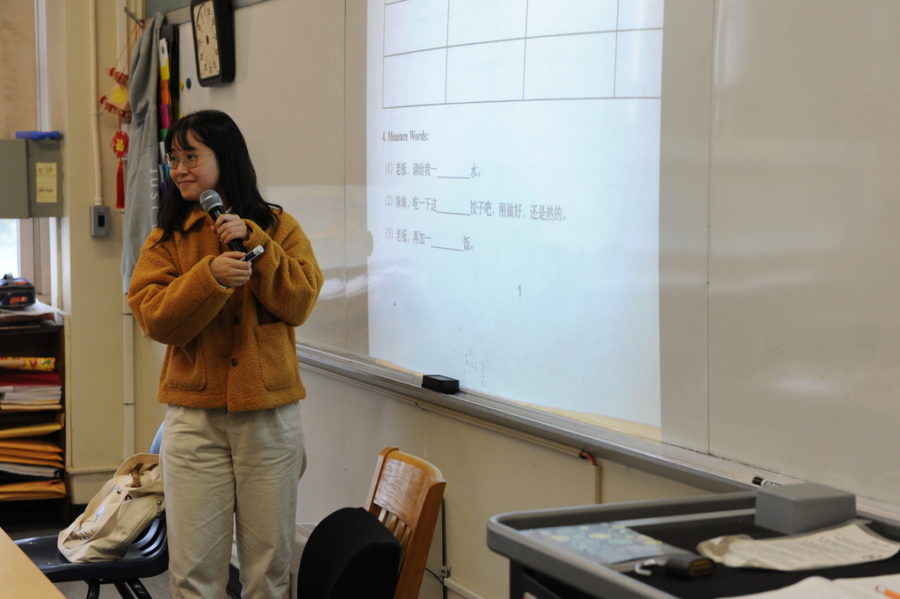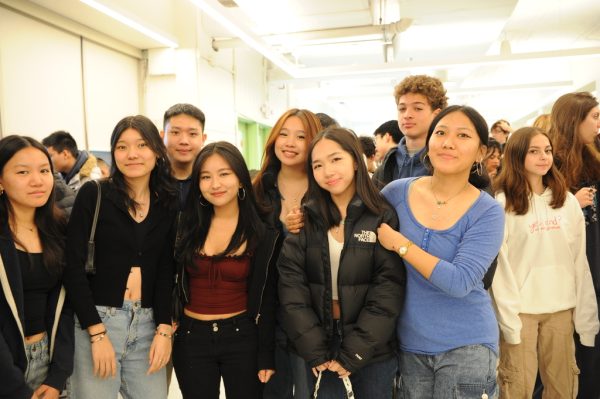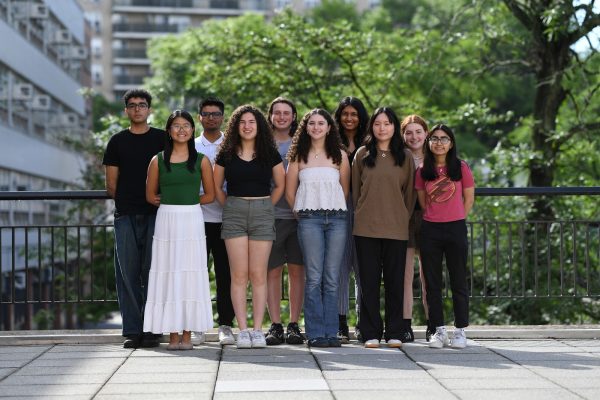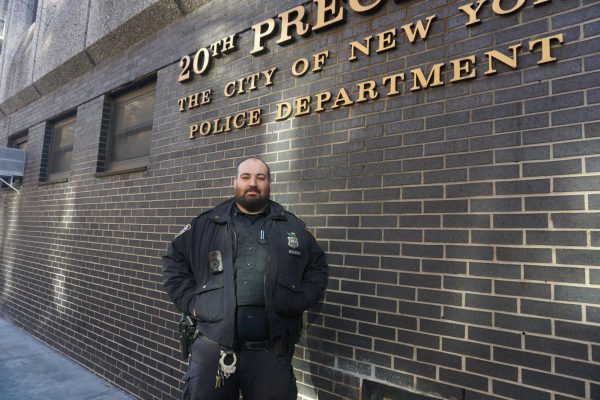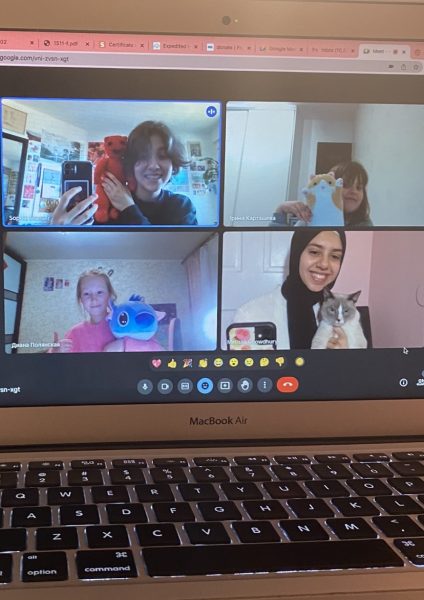The Wonders of the Bronx Science World Languages Department
Despite the school’s foundation being built on chemical elements and calculus derivatives, the World Languages Department is vital to keeping the heart of Bronx Science beating.
The World Languages Department highly values and encourages student led discussion as a method of learning. A student taking Chinese (Mandarin) can be seen here presenting in one of the many Advanced Placement classes offered at Bronx Science.
From its original founding in 1938, Bronx Science has been a driving force within the STEM field. With eight Nobel Prize award winning alumni in physics and chemistry, more than any other secondary education institution in the United States, the school has built its reputation on STEM studies. Even the school logo, an atom, demonstrates its allegiance to STEM fields, making it potentially difficult for some to see past those departments. However, the World Languages Department is vital to keeping the heart of Bronx Science beating.
Bronx Science offers classes in six different world languages: Chinese (Mandarin), French, Italian, Japanese, Latin, and Spanish. The classes in each language stretch from first level to Advanced Placement.
Studying a second language offers numerous cognitive benefits, especially for the developing mind of a high school student. “In a meta-analysis of 20 studies examining language learning and its impact on academic performance, the majority of studies (90%) showed that language learners perform better across a range of academic subjects than students who don’t study a second language,” noted Carley Spence in Cambridge University Press & Assessment. Learning another language can boost student literacy, providing an advantage in other school subjects such as science and mathematics. Acquiring language skills can improve communication in one’s native language as well. It can enhance vocabulary, grammar, and writing skills, making students more effective communicators overall.
According to Dana G. Smith in Scientific American, “Scientists concluded that the ability to learn a new language, at least grammatically, is strongest until the age of 18 after which there is a precipitous decline.” Cognitive development is enhanced particularly in the areas of memory, problem-solving, and critical thinking. This can help students perform better academically and develop strong analytical skills that can be applied in many areas of their lives. Partaking in the learning of another language is essential for students of this age, and the Bronx Science World Languages Department provides the necessary opportunities for exploration.
The study of language can also help foster a bridge between cultural divides. With an increase in exposure, the knowledge gained from learning a second language contributes to a greater understanding of different cultural customs. Students can hold more empathy towards a group of people, reducing potential internalized prejudices that can stem from unknowns. Ms. Damayanti Chuy, a Bronx Science Spanish teacher, provided her own opinion. “I truly believe that it makes you a more open person and allows you to explore different aspects of the world. We’re always learning, even as teachers. We make sure to address and respect all cultures.” The study of world languages can also instill a greater sense of appreciation for one’s own culture and serve as a gateway into interest for a wide range of other subjects. Mr. Richard Carli, a Latin teacher, spoke from his perspective. “Language classes are so fun to teach because they comprise culture, history, literature, music, and all other aspects of life. Expressing ourselves in different languages helps us understand not only more about other cultures but about ourselves.”
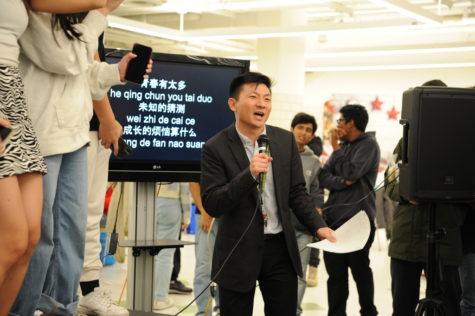
The benefits of learning another language are known throughout the world. “In Spanish, we have a saying, ‘un hombre que habla dos lenguas vale por dos,’ which means a person who speaks two languages is worth two,” said Ms. Chuy.
Madalee Weissman ’25, shared her experience of studying Italian. “Living in New York, we’re surrounded by a multitude of cultures. Growing up, I’ve always wanted to go to Italy, mostly just for the food and its aesthetics. Though in taking Italian class, I’ve recognized the beauty of both its language’s intricacies, as well as its culture’s unique traditions, and wonderful people. Overall, I have really fallen in love with it. The entire experience has been truly enlightening.”
Antonia Duffey ’24, a student currently taking Japanese level 3, explained why she chose to take the class. “I wanted to try something new in high school after studying Spanish for several years. I chose Japanese because I got into anime during the Coronavirus pandemic, and my mom encouraged me to learn the language. It’s very close knit. I have a lot of friends I made through the class, so it’s a really nice experience.”
“I didn’t really know much about the French language or culture until I got to Bronx Science,” said Tara Tomić ’25. “Taking French has definitely changed my outlook on the structure of language and ways of expression. In the past, I don’t think I recognized its importance but I’m glad I can say my appreciation has grown through my language class.”
Even if a student gravitates towards STEM fields, the study of world languages is just as important. “The nice part about teaching Latin is that there are thousands of years of history and human progress to use as examples in my teaching. Many of the early pioneers of math and science lived in the ancient world, and I get to use them and their writing as examples in my courses to help engage our more STEM-focused students,” said Mr. Carli.
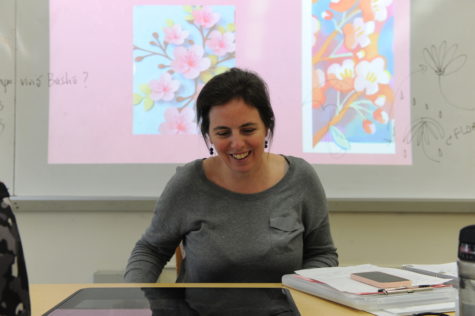
Ms. Chuy shares her reasoning for choosing her profession. “I love languages and I speak several. I think because of my own struggles and personal experiences with learning them, I like to help students overcome their obstacles.” This passion is a commonly seen theme throughout the department. “I was getting a Ph.D. in classical studies and really loved the teaching aspect more than the research and writing, and I saw an opportunity for a good career sharing my love of ancient languages here at Bronx Science,” said Mr. Carli.
Despite the school only requiring three years worth of language credits needed in order to graduate, many dedicated students decide to continue their studies past the minimum requirements. Andrew Morrissey ’23 is one of them. “I saw a fourth year of language as an opportunity to go beyond the basics of grammar and vocabulary that have been taught to me throughout my educational career. Speaking with my classmates, both inside and outside of the classroom, enriched my understanding of the Spanish language more than any written assignment could have. Over time, my Spanish-speaking abilities improved so that I could share my knowledge of the language with those I care about,” said Morrissey.
The World Language classes offered at Bronx Science go beyond typical Advanced Placement classes. For instance, classes such as Spanish Advanced Conversation, Spanish Film and Narrative, and Advanced Spanish for Professions all inspire students to continue their studies. “Whatever language you choose to study, it will always help you in the future. For example it could help you to communicate with your client in Chile who expects you to not struggle with Spanish. Or you could get a promotion because you’re bilingual, trilingual, or a polyglot,” said Ms. Chuy.
The lessons are often conducted in a hands-on manner, immersing students in the vocabulary that can be used in real-life scenarios. By offering a diverse range of courses and emphasizing the practical application of language skills, the department equips students with the necessary tools needed to communicate effectively with people from different backgrounds. The study of a second language is an integral part of the Bronx Science high school experience, and the World Languages Department plays a crucial role in preparing students for success in an increasingly globalized world.
“In Spanish, we have a saying, ‘un hombre que habla dos lenguas vale por dos,’ which means a person who speaks two languages is worth two,” said Ms. Damayanti Chuy, a Spanish teacher at Bronx Science.
Nora Torok is a Copy Chief for ‘The Science Survey.' At the young age of eight, Nora developed a passion for journalism. It was not long until she shaped...
Arianna Hwang is an Editorial Editor for ‘The Science Survey.' She enjoys reading and writing articles as she believes it is important to hear the opinions...
Susan Cohen is an Editor-in-Chief and Chief Graphic Designer for ‘The Observatory’ yearbook, as well as a Staff Reporter for 'The Science Survey.'...
Jacey Mok is an Editor-in-Chief for 'The Science Survey.' She loves the art of masterfully crafting a story and bringing the reader into the scene. She...

